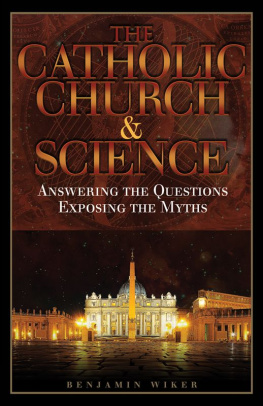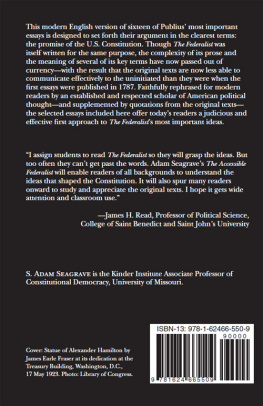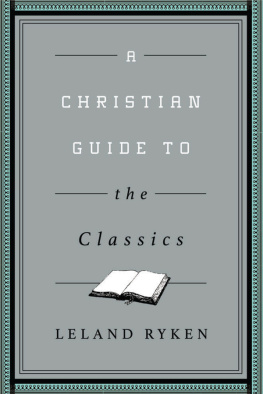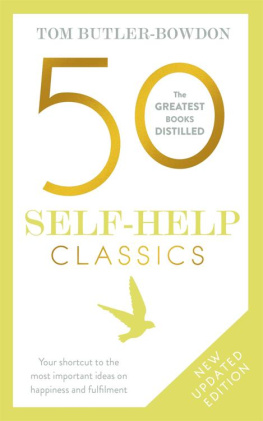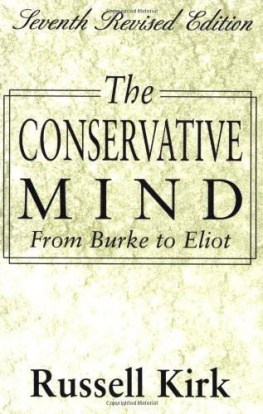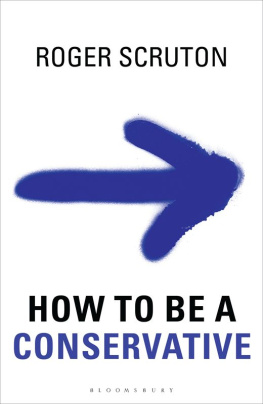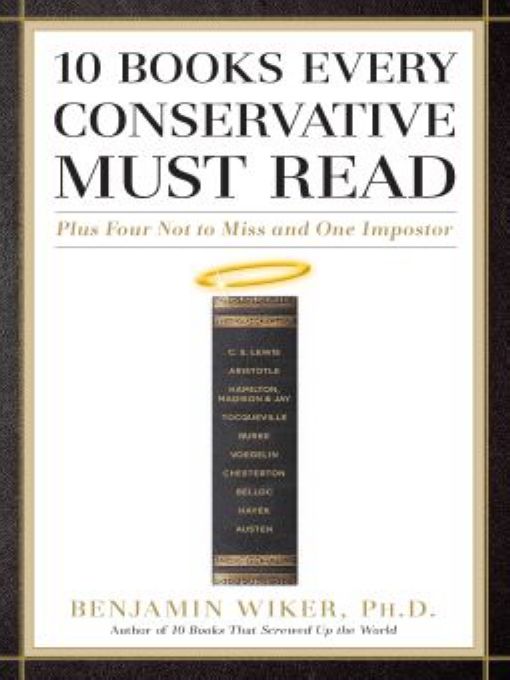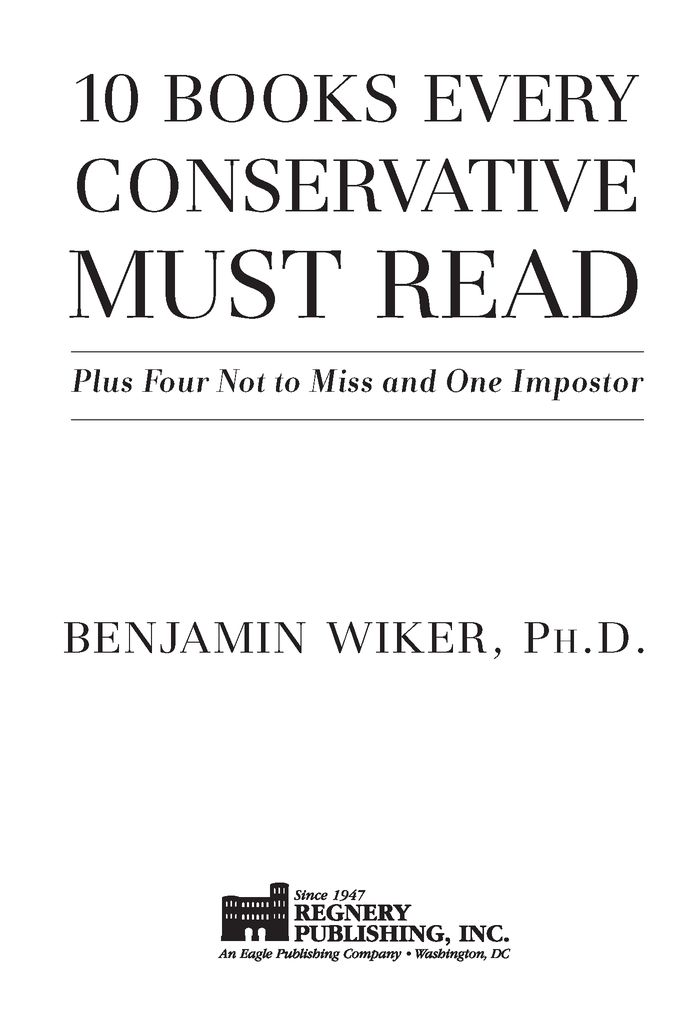Table of Contents
For Brian and Troy who dug us out of the snow,
and for Carter who kept us in haysuch is the stuff
of real community.
INTRODUCTION
Why These Books and Not...
THE IDEA FOR THIS BOOK CAME FROM THE READERS OF ANOTHER of my books, Ten Books that Screwed Up the World: And Five Others That Didnt Help. Needless to say, that book was about bad books, books that the world would have been far better off without. Given the number of really horrible books, it was difficult to winnow it down to fifteen. Readers agreed, after theyd gotten through my analysis, that these were indeed horrible books, and their ill effects had, if anything, grown through time. In fact, one of the most important of the criteria in choosing themfrom Machiavellis The Prince and Thomas Hobbes Leviathan to Marxs Communist Manifesto , Alfred Kinseys Sexual Behavior in the Human Male, and Betty Friedans Feminine Mystiqueis that their baneful influence continues to form so many aspects of our culture.
Bad ideas and their malignant influence make for depressing news, even though it is imperative that we understand them. So, one of the most frequently asked questions from interviewers and readers was, Why dont you write a book about good books? This came as much as an inquiry as a plea. And so, here it is: Ten Books Every Conservative Must Read: Plus Four Not to Miss and One Impostor. Here are the good books, the books which, if taken with the utmost seriousness, could transform a rotting culture into a blossoming one.
I have no doubt that the most frequently asked question Ill have to answer about this book is Why didnt you include ____________________! Notice, its not really a question, but as the exclamation point at the end suggests, an incredulous outcry that I didnt include a certain favorite conservative book among the Ten Books Every Conservative Must Read: Plus Four Not to Miss and One Impostor. When it is discovered that the impostor is Ayn Rands Atlas Shrugged, Im sure Ill hear even more howls of indignation. So a bit of explanation is due right at the get go.
Lets leave the question of Rands status on the side for a moment, and deal with the whole business of my choice of books that every conservative must read. As with Ten Books that Screwed Up the World, it was extremely difficult to whittle the list down. But its not the point of my book simply to provide a list, long or short, of books to read. This is a book about conservative ideas, key concepts, essential principlesthings that, given the intellectual and moral dilapidation of much of the culture, every conservative must understand in order to make any solid rebuilding possible. As with the first Ten Books, the premise is that ideas have consequences. Bad ideas have bad consequences, but good ideas have good consequences.
So my focus now is on the books that every conservative must read. The emphasis on must implies that it is not My Ten Favorite Conservative Books, or Ten Top-Selling Conservative Books. Rather, the choices were made based upon what conservatives must read in light of our present condition. We live in a culture that is largely defined by liberalism, but there is a swelling conservative reaction. Unfortunately, while that reaction is welcome, it is too often simply a reaction rather than a well-thought-out and effective response deeply informed by truly conservative principles. It is my hope that this book can help to carry out a conservative renaissance, a deep revolution, so that the conservative zeal animating so many souls can have a lasting and profound effect. If the books Ive chosen would form the basis of a sustained conservative conversation, the cultural battle lines would be more clearly drawn, the strategies more cogently articulated, and hope more firmly grounded.
All that having been said, there are plenty of other books that could have been included. I know this, because I had to make the painful choices. But notice, the title isnt The Only Ten Books Conservatives Must Read. I am not being exclusive. There are easily a hundred or more books that could be heartily recommended to conservatives.
In making this selection, youll notice very important books that didnt make the final cut. Some are obvious, like Adam Smiths The Wealth of Nations. Some have been extremely important to me, but are controversial, like Leo Strauss Natural Right and History. Some are theological, like St. Augustines City of God. Some are exceedingly difficult, like Aristotles Metaphysics. Some are works of epic poetry, like Dantes Divine Comedy. Some take the form of philosophic dialogues, like Platos masterful Gorgias. Some are deeply conservative, but have been horribly misunderstood by conservatives, like Platos Republic. Some are actually ambiguous, like John Lockes Second Treatise of Civil Government. Some are closely akin to the form of this book, like Russell Kirks The Roots of American Order or The Conservative Mind. Some are extremely informative, like George Nashs The Conservative Intellectual in America Since 1945. Some are American conservative classics, like Whittaker Chambers Witness or William F. Buckleys God and Man at Yale. Obviously, given my quip above, Richard Weavers Ideas Have Consequences would seem a must-read.
Even without entering into a discussion with anyone else, I could get into arguments with myself over another fifty must-reads. Let in another to the debate, and wed never get down to actually studying any one text. If for no other reason than space considerations, hard choices had to be made. My reasons could be given for each.
For example, conservatism is about much more than economicsthat is why I include philosophy, political philosophy, theology, and literature. Choices had to be made about which books on economics were to be included. I chose Friedrich Hayeks Road to Serfdom over Adam Smiths Wealth of Nations. I have always been very wary of Smiths close intellectual and personal ties to the consummate Enlightenment skeptic, David Hume (many of whose works would be worthy candidates for a follow-up book, Ten More Books that Screwed Up the World ) and worried about Smiths connections to the Parisian salon of the notorious revolutionary, Baron dHolbach. What is of merit in Smith can be found in Hayek. That is an arguable point, and well worth arguing. But few conservatives would deny the great importance of Hayeks Road to Serfdom, and its intellectual contextthe rise of socialism in the twentieth centuryis certainly more germane and instructive for conservatives faced with a resurgence of FDR-ism in the present political administration. Hayek therefore forms a better locus of conservative discussion, debate, and action.
But I will not bore readers with a very long explanation of why I didnt choose this or that book. That would deflect us from the real task at hand, gathering the conservative wisdom from those I have chosen, and that is the task we must now undertake without any further delay. Readers will soon understand why Ive chosen these books.
Part I
Just What Exactly Is Conservatism?
THIS BOOK ABOUT BOOKS IS DIVIDED INTO FOUR MAIN PARTS according to four important themes: the first, concerning the nature of conservatism itself; the second, focusing on the American founding; the third, dealing with economics; and the last, pressing home the importance of forming the conservative imagination.


